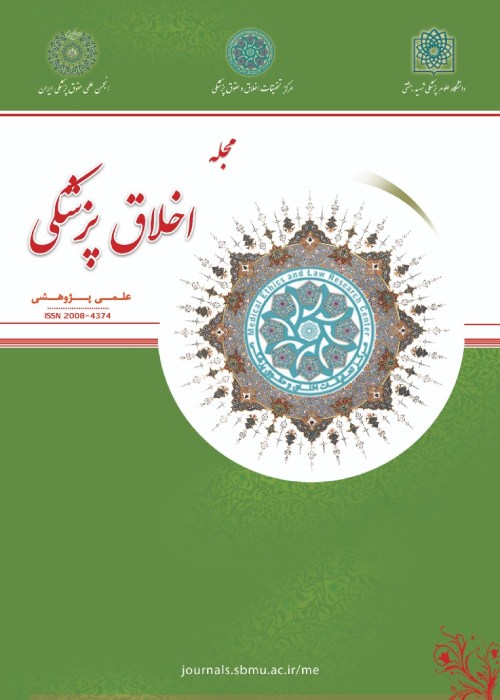Moral intelligence and its dimensions in nurses working in hospitals in Arak city
Author(s):
Article Type:
Research/Original Article (دارای رتبه معتبر)
Abstract:
Background And Aim
Many of the employee's and manager's behaviors and decisions are influenced by their ethical values. Work ethics can affect the performance of employees through better regulation of relationships, reduction of disagreement and conflicts, increasing the atmosphere of understanding and cooperation, and reducing the costs of monitoring. Among the various professions, nursing care can be a clear example of moral performance; the ultimate goal of the nursing profession is the improvement of human health, which can only be achieved through scientific and ethical care and the correct relationship with the patient. Among all kinds of intelligence, moral intelligence is related only to the study of ethics rules and helps us to understand moral teachings. The dimensions of moral intelligence of nurses play an important role in their attitude toward ethical standards. The aim of this study was to determine the moral intelligence of nurses working in hospitals of Arak city.Materials And Methods
In this descriptive cross-sectional study, 176 nurses working in hospitals of Arak city in 2015 were randomly selected. First, according to the statistics of each hospital, the sample size of each hospital were calculated based on the number of nurses working in them. Then, the samples were selected using a random figures table from the hospital statistics. The criteria for entering the research included the minimum degree of nursing bachelor. The data collection tool was a two-part questionnaire. The demographic information included age, marriage, education, sex, type of employment and work experience, and the second part was the questionnaire consisted of 40 questions about moral intelligence. In the present study, following the permission of the researcher, the translated version by Abbaszadeh et al. was used. The questions included the status of the level of moral intelligence based on Likert scale of 5 states. The questionnaire was scored as 5 points = fully agree, 4 points = fairly agree, 3 points = no opinion, 2 points = fairly opposite, 1 point = totally opposite. The score of the respondent's answers to the questions of moral intelligence dimensions including integrity (16 questions), compassion (4 questions), forgiveness (8 questions) and responsibility (12 questions) were recorded as the final score of the nurses. In total, each person earns a score between 20 and 100. According to the toolkit, the score obtained by each individual, up to 53 points of poor moral intelligence, up to 69 as average, to 85 as good, and more, is interpreted very well. Data was collected from all hospitals for 15 days. A total of 180 questionnaires were distributed by the researcher at various times and at the situations that the nurse was prepared to answer the questions. After ten minutes, completed questionnaires were delivered. Data were analyzed using SPSS ver.16 statistical software. Descriptive statistical methods (frequency, mean and standard deviation) and inferential statistics (T-test, fisher, and one-way variance) were used to analyze the data.Ethical considerations: This research is the result of a research project approved by the Research Ethics Committee of Shahid Beheshti University of Medical Sciences and endorsed with ID No. IR.Arakmu.Rec.1394.33. The oral consent of the participants was obtained for participation in the research and the confidentiality of information was assured.
Findings: Most participants were female, married, officially employed, with a bachelor degree, and a work experience of less than 7 years. 11.4% of nurses had excellent moral intelligence and 18.8% had poor moral intelligence. The mean score of total moral intelligence was calculated to be 32.27 ± 8.28. Also, the mean of integrity dimension was 31.4 ± 4.13, the responsibility rate was 23.23 ± 3.36, the compassion dimension was 7.75 ± 3.1 and the rate of forgiveness was 15.22 ± 3.2. The level of moral intelligence was poor in 33 subjects (18.8%), in 67 subjects (31.8%) were good, in 56 subjects (31.8%) was very good, and in 20 subjects (11.4%) was at the high level. Based on Fisher exact test, there was no significant correlation between moral intelligence and demographic characteristics of the participants (P> 0.05).
Conclusion
The desirable level of moral intelligence in nurses demonstrates the importance of acquiring moral values for them and indirectly reflecting the ethical performance of nurses in clinical settings. This can indicate the importance of nurses respecting ethical standards as well as emphasizing the moral nature of the clinical environment. Therefore, it is suggested that managers of health care centers adopt strategies such as holding educational courses to strengthen nurse's moral intelligence.Keywords:
Language:
Persian
Published:
Journal of Medical Ethics, Volume:11 Issue: 41, 2017
Pages:
37 to 44
magiran.com/p1772292
دانلود و مطالعه متن این مقاله با یکی از روشهای زیر امکان پذیر است:
اشتراک شخصی
با عضویت و پرداخت آنلاین حق اشتراک یکساله به مبلغ 1,390,000ريال میتوانید 70 عنوان مطلب دانلود کنید!
اشتراک سازمانی
به کتابخانه دانشگاه یا محل کار خود پیشنهاد کنید تا اشتراک سازمانی این پایگاه را برای دسترسی نامحدود همه کاربران به متن مطالب تهیه نمایند!
توجه!
- حق عضویت دریافتی صرف حمایت از نشریات عضو و نگهداری، تکمیل و توسعه مگیران میشود.
- پرداخت حق اشتراک و دانلود مقالات اجازه بازنشر آن در سایر رسانههای چاپی و دیجیتال را به کاربر نمیدهد.
In order to view content subscription is required
Personal subscription
Subscribe magiran.com for 70 € euros via PayPal and download 70 articles during a year.
Organization subscription
Please contact us to subscribe your university or library for unlimited access!


